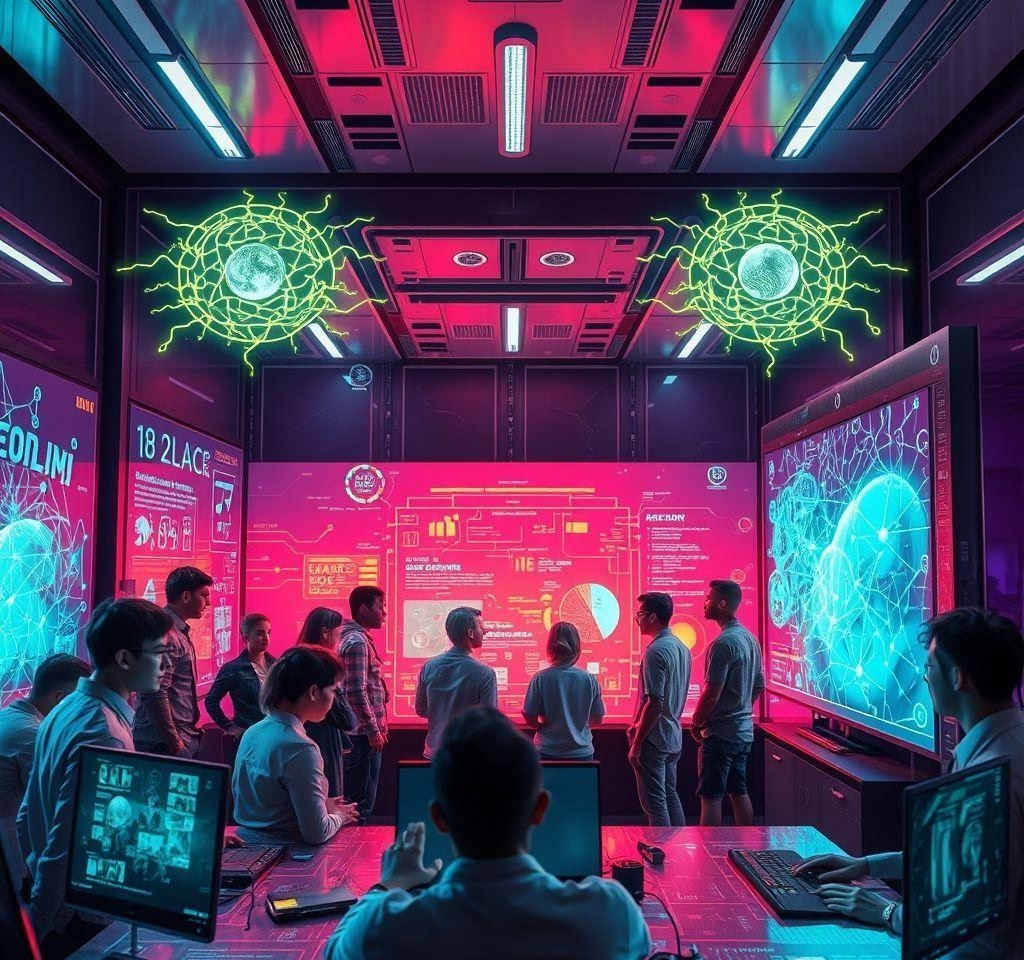Revolutionizing Storytelling: AI in Game Narrative Design
The integration of AI into game narrative design is reshaping player experiences, enabling stories that adapt dynamically to individual choices. This article explores tools, techniques, and ethical considerations for developers aiming to blend creativity with cutting-edge technology.
The Role of AI in Modern Game Narratives
The Role of AI in Modern Game Narratives:
AI’s transformative impact on narrative design is undeniable. Automated story generation allows for vast, branching narratives previously impossible to create manually. Procedural content generation populates game worlds with dynamic detail, ensuring replayability. Adaptive storytelling adjusts narratives based on player choices, creating unique experiences. This offers unprecedented levels of engagement and personalization.
Case studies illustrate AI’s power. Dynamic quests in open-world games adjust based on player actions. Consider the possibilities: players encountering unique challenges and rewards. Automated dialogue systems generate realistic conversations, enhancing immersion and player agency. These systems can adapt to player choices, creating organic and unpredictable storylines.
The combination of automated systems and adaptive storytelling is revolutionizing the industry. Developers can create expansive game worlds and engaging narratives with greater efficiency. The focus shifts from crafting linear storylines to designing dynamic systems that react to player input. This leads to a more meaningful and interactive gaming experience. The future of game narratives lies in sophisticated AI integrations.
Dynamic Storytelling Techniques
The Role of AI in Modern Game Narratives:
AI’s transformative impact on narrative design is undeniable. Automated story generation allows for vast, branching narratives previously impossible to create manually. Procedural content generation populates game worlds with dynamic detail, ensuring replayability. Adaptive storytelling adjusts narratives based on player choices, creating unique experiences. This offers unprecedented levels of engagement and personalization.
Case studies illustrate AI’s power. Dynamic quests in open-world games adjust based on player actions. Consider the possibilities: players encountering unique challenges and rewards. Automated dialogue systems generate realistic conversations, enhancing immersion and player agency. These systems can adapt to player choices, creating organic and unpredictable storylines.
The combination of automated systems and adaptive storytelling is revolutionizing the industry. Developers can create expansive game worlds and engaging narratives with greater efficiency. The focus shifts from crafting linear storylines to designing dynamic systems that react to player input. This leads to a more meaningful and interactive gaming experience. The future of game narratives lies in sophisticated AI integrations.
Character Development with AI
The Role of AI in Modern Game Narratives:
AI’s transformative impact on narrative design is undeniable. Automated story generation allows for vast, branching narratives previously impossible to create manually. Procedural content generation populates game worlds with dynamic detail, ensuring replayability. Adaptive storytelling adjusts narratives based on player choices, creating unique experiences. This offers unprecedented levels of engagement and personalization.
Case studies illustrate AI’s power. Dynamic quests in open-world games adjust based on player actions. Consider the possibilities: players encountering unique challenges and rewards. Automated dialogue systems generate realistic conversations, enhancing immersion and player agency. These systems can adapt to player choices, creating organic and unpredictable storylines.
The combination of automated systems and adaptive storytelling is revolutionizing the industry. Developers can create expansive game worlds and engaging narratives with greater efficiency. The focus shifts from crafting linear storylines to designing dynamic systems that react to player input. This leads to a more meaningful and interactive gaming experience. The future of game narratives lies in sophisticated AI integrations.
Player-Centric Narratives
The Role of AI in Modern Game Narratives:
AI’s transformative impact on narrative design is undeniable. Automated story generation allows for vast, branching narratives previously impossible to create manually. Procedural content generation populates game worlds with dynamic detail, ensuring replayability. Adaptive storytelling adjusts narratives based on player choices, creating unique experiences. This offers unprecedented levels of engagement and personalization.
Case studies illustrate AI’s power. Dynamic quests in open-world games adjust based on player actions. Consider the possibilities: players encountering unique challenges and rewards. Automated dialogue systems generate realistic conversations, enhancing immersion and player agency. These systems can adapt to player choices, creating organic and unpredictable storylines.
The combination of automated systems and adaptive storytelling is revolutionizing the industry. Developers can create expansive game worlds and engaging narratives with greater efficiency. The focus shifts from crafting linear storylines to designing dynamic systems that react to player input. This leads to a more meaningful and interactive gaming experience. The future of game narratives lies in sophisticated AI integrations.
Ethical and Practical Considerations
The Role of AI in Modern Game Narratives:
AI’s transformative impact on narrative design is undeniable. Automated story generation allows for vast, branching narratives previously impossible to create manually. Procedural content generation populates game worlds with dynamic detail, ensuring replayability. Adaptive storytelling adjusts narratives based on player choices, creating unique experiences. This offers unprecedented levels of engagement and personalization.
Case studies illustrate AI’s power. Dynamic quests in open-world games adjust based on player actions. Consider the possibilities: players encountering unique challenges and rewards. Automated dialogue systems generate realistic conversations, enhancing immersion and player agency. These systems can adapt to player choices, creating organic and unpredictable storylines.
The combination of automated systems and adaptive storytelling is revolutionizing the industry. Developers can create expansive game worlds and engaging narratives with greater efficiency. The focus shifts from crafting linear storylines to designing dynamic systems that react to player input. This leads to a more meaningful and interactive gaming experience. The future of game narratives lies in sophisticated AI integrations.
The Role of AI in Modern Game Narratives
Dynamic Storytelling Techniques:
AI algorithms are revolutionizing storytelling in games. They enable branching narratives, real-time plot adjustments, and sophisticated player choice analysis. Machine learning models predict player engagement, allowing for optimized story pacing. This ensures players remain invested, regardless of their choices.
These algorithms create dynamic, personalized experiences. Players feel their decisions have meaningful consequences. The narrative adapts to their play style. The result is a much more immersive and engaging experience. AI allows for complex narratives, previously impossible to manually craft.
Consider the potential impact on open-world games. AI can create adaptive quests, procedural environments and responsive characters. These react to player choices in real-time. Such dynamic elements deepen immersion. AI allows developers to focus on the overall narrative structure. They don’t need to manually script every possible outcome.
Dynamic Storytelling Techniques
Dynamic Storytelling Techniques:
AI algorithms are revolutionizing storytelling in games. They enable branching narratives, real-time plot adjustments, and sophisticated player choice analysis. Machine learning models predict player engagement, allowing for optimized story pacing. This ensures players remain invested, regardless of their choices.
These algorithms create dynamic, personalized experiences. Players feel their decisions have meaningful consequences. The narrative adapts to their play style. The result is a much more immersive and engaging experience. AI allows for complex narratives, previously impossible to manually craft.
Consider the potential impact on open-world games. AI can create adaptive quests, procedural environments and responsive characters. These react to player choices in real-time. Such dynamic elements deepen immersion. AI allows developers to focus on the overall narrative structure. They don’t need to manually script every possible outcome.
Character Development with AI
Dynamic Storytelling Techniques:
AI algorithms are revolutionizing storytelling in games. They enable branching narratives, real-time plot adjustments, and sophisticated player choice analysis. Machine learning models predict player engagement, allowing for optimized story pacing. This ensures players remain invested, regardless of their choices.
These algorithms create dynamic, personalized experiences. Players feel their decisions have meaningful consequences. The narrative adapts to their play style. The result is a much more immersive and engaging experience. AI allows for complex narratives, previously impossible to manually craft.
Consider the potential impact on open-world games. AI can create adaptive quests, procedural environments and responsive characters. These react to player choices in real-time. Such dynamic elements deepen immersion. AI allows developers to focus on the overall narrative structure. They don’t need to manually script every possible outcome.
Player-Centric Narratives
Dynamic Storytelling Techniques:
AI algorithms are revolutionizing storytelling in games. They enable branching narratives, real-time plot adjustments, and sophisticated player choice analysis. Machine learning models predict player engagement, allowing for optimized story pacing. This ensures players remain invested, regardless of their choices.
These algorithms create dynamic, personalized experiences. Players feel their decisions have meaningful consequences. The narrative adapts to their play style. The result is a much more immersive and engaging experience. AI allows for complex narratives, previously impossible to manually craft.
Consider the potential impact on open-world games. AI can create adaptive quests, procedural environments and responsive characters. These react to player choices in real-time. Such dynamic elements deepen immersion. AI allows developers to focus on the overall narrative structure. They don’t need to manually script every possible outcome.
Ethical and Practical Considerations
Dynamic Storytelling Techniques:
AI algorithms are revolutionizing storytelling in games. They enable branching narratives, real-time plot adjustments, and sophisticated player choice analysis. Machine learning models predict player engagement, allowing for optimized story pacing. This ensures players remain invested, regardless of their choices.
These algorithms create dynamic, personalized experiences. Players feel their decisions have meaningful consequences. The narrative adapts to their play style. The result is a much more immersive and engaging experience. AI allows for complex narratives, previously impossible to manually craft.
Consider the potential impact on open-world games. AI can create adaptive quests, procedural environments and responsive characters. These react to player choices in real-time. Such dynamic elements deepen immersion. AI allows developers to focus on the overall narrative structure. They don’t need to manually script every possible outcome.
The Role of AI in Modern Game Narratives
Character Development with AI:
AI is transforming character development in games. Natural language processing gives Non-Player Characters (NPCs) realistic dialogue. Emotional depth makes interactions feel more genuine. Personalized interactions, memory retention, and evolving relationships enhance immersion.
Examples such as AI companions in RPGs showcase this. These companions learn player preferences. They adapt their behavior accordingly. This creates dynamic relationships. The player’s actions directly influence the NPC’s personality. This fosters a sense of connection and investment.
AI allows for complex character arcs. NPCs react realistically to events. Their personalities evolve throughout the game. This creates unforeseen consequences. Developers can focus on overall character design. AI handles intricate details and interactions.
The future of gaming involves increasingly sophisticated AI companions. These will display genuine emotional responses. They will have long-term memories and lasting bonds with players. This will greatly enhance immersion and emotional investment in the game world.
Dynamic Storytelling Techniques
Character Development with AI:
AI is transforming character development in games. Natural language processing gives Non-Player Characters (NPCs) realistic dialogue. Emotional depth makes interactions feel more genuine. Personalized interactions, memory retention, and evolving relationships enhance immersion.
Examples such as AI companions in RPGs showcase this. These companions learn player preferences. They adapt their behavior accordingly. This creates dynamic relationships. The player’s actions directly influence the NPC’s personality. This fosters a sense of connection and investment.
AI allows for complex character arcs. NPCs react realistically to events. Their personalities evolve throughout the game. This creates unforeseen consequences. Developers can focus on overall character design. AI handles intricate details and interactions.
The future of gaming involves increasingly sophisticated AI companions. These will display genuine emotional responses. They will have long-term memories and lasting bonds with players. This will greatly enhance immersion and emotional investment in the game world.
Character Development with AI
Character Development with AI:
AI is transforming character development in games. Natural language processing gives Non-Player Characters (NPCs) realistic dialogue. Emotional depth makes interactions feel more genuine. Personalized interactions, memory retention, and evolving relationships enhance immersion.
Examples such as AI companions in RPGs showcase this. These companions learn player preferences. They adapt their behavior accordingly. This creates dynamic relationships. The player’s actions directly influence the NPC’s personality. This fosters a sense of connection and investment.
AI allows for complex character arcs. NPCs react realistically to events. Their personalities evolve throughout the game. This creates unforeseen consequences. Developers can focus on overall character design. AI handles intricate details and interactions.
The future of gaming involves increasingly sophisticated AI companions. These will display genuine emotional responses. They will have long-term memories and lasting bonds with players. This will greatly enhance immersion and emotional investment in the game world.
Player-Centric Narratives
Character Development with AI:
AI is transforming character development in games. Natural language processing gives Non-Player Characters (NPCs) realistic dialogue. Emotional depth makes interactions feel more genuine. Personalized interactions, memory retention, and evolving relationships enhance immersion.
Examples such as AI companions in RPGs showcase this. These companions learn player preferences. They adapt their behavior accordingly. This creates dynamic relationships. The player’s actions directly influence the NPC’s personality. This fosters a sense of connection and investment.
AI allows for complex character arcs. NPCs react realistically to events. Their personalities evolve throughout the game. This creates unforeseen consequences. Developers can focus on overall character design. AI handles intricate details and interactions.
The future of gaming involves increasingly sophisticated AI companions. These will display genuine emotional responses. They will have long-term memories and lasting bonds with players. This will greatly enhance immersion and emotional investment in the game world.
Ethical and Practical Considerations
Character Development with AI:
AI is transforming character development in games. Natural language processing gives Non-Player Characters (NPCs) realistic dialogue. Emotional depth makes interactions feel more genuine. Personalized interactions, memory retention, and evolving relationships enhance immersion.
Examples such as AI companions in RPGs showcase this. These companions learn player preferences. They adapt their behavior accordingly. This creates dynamic relationships. The player’s actions directly influence the NPC’s personality. This fosters a sense of connection and investment.
AI allows for complex character arcs. NPCs react realistically to events. Their personalities evolve throughout the game. This creates unforeseen consequences. Developers can focus on overall character design. AI handles intricate details and interactions.
The future of gaming involves increasingly sophisticated AI companions. These will display genuine emotional responses. They will have long-term memories and lasting bonds with players. This will greatly enhance immersion and emotional investment in the game world.
The Role of AI in Modern Game Narratives
Player-Centric Narratives:
AI systems are transforming game design by analyzing player behavior. This allows for dynamic adjustments to difficulty, story outcomes, and emotional resonance. The goal is to balance player agency with the developer’s intended narrative. AI algorithms track player choices, play styles, and emotional responses.
This data informs real-time adjustments. For instance, difficulty scales based on player performance. Story branches adjust based on choices. The game adapts to the player’s emotional engagement. This personalizes the experience, increasing immersion and replayability.
Balancing player agency with developer intent is crucial. AI can guide the narrative, but shouldn’t override the player’s choices completely. A well-designed system offers freedom within a structured narrative framework. The result is a unique experience for each player, while still delivering a cohesive and meaningful story.
The future of games lies in player-centric narratives. AI will create increasingly sophisticated and personalized experiences. Players feel their choices have significant impact. The developer’s vision remains intact, creating satisfying and memorable gaming experiences.
Dynamic Storytelling Techniques
Player-Centric Narratives:
AI systems are transforming game design by analyzing player behavior. This allows for dynamic adjustments to difficulty, story outcomes, and emotional resonance. The goal is to balance player agency with the developer’s intended narrative. AI algorithms track player choices, play styles, and emotional responses.
This data informs real-time adjustments. For instance, difficulty scales based on player performance. Story branches adjust based on choices. The game adapts to the player’s emotional engagement. This personalizes the experience, increasing immersion and replayability.
Balancing player agency with developer intent is crucial. AI can guide the narrative, but shouldn’t override the player’s choices completely. A well-designed system offers freedom within a structured narrative framework. The result is a unique experience for each player, while still delivering a cohesive and meaningful story.
The future of games lies in player-centric narratives. AI will create increasingly sophisticated and personalized experiences. Players feel their choices have significant impact. The developer’s vision remains intact, creating satisfying and memorable gaming experiences.
Character Development with AI
Player-Centric Narratives:
AI systems are transforming game design by analyzing player behavior. This allows for dynamic adjustments to difficulty, story outcomes, and emotional resonance. The goal is to balance player agency with the developer’s intended narrative. AI algorithms track player choices, play styles, and emotional responses.
This data informs real-time adjustments. For instance, difficulty scales based on player performance. Story branches adjust based on choices. The game adapts to the player’s emotional engagement. This personalizes the experience, increasing immersion and replayability.
Balancing player agency with developer intent is crucial. AI can guide the narrative, but shouldn’t override the player’s choices completely. A well-designed system offers freedom within a structured narrative framework. The result is a unique experience for each player, while still delivering a cohesive and meaningful story.
The future of games lies in player-centric narratives. AI will create increasingly sophisticated and personalized experiences. Players feel their choices have significant impact. The developer’s vision remains intact, creating satisfying and memorable gaming experiences.
Player-Centric Narratives
Player-Centric Narratives:
AI systems are transforming game design by analyzing player behavior. This allows for dynamic adjustments to difficulty, story outcomes, and emotional resonance. The goal is to balance player agency with the developer’s intended narrative. AI algorithms track player choices, play styles, and emotional responses.
This data informs real-time adjustments. For instance, difficulty scales based on player performance. Story branches adjust based on choices. The game adapts to the player’s emotional engagement. This personalizes the experience, increasing immersion and replayability.
Balancing player agency with developer intent is crucial. AI can guide the narrative, but shouldn’t override the player’s choices completely. A well-designed system offers freedom within a structured narrative framework. The result is a unique experience for each player, while still delivering a cohesive and meaningful story.
The future of games lies in player-centric narratives. AI will create increasingly sophisticated and personalized experiences. Players feel their choices have significant impact. The developer’s vision remains intact, creating satisfying and memorable gaming experiences.
Ethical and Practical Considerations
Player-Centric Narratives:
AI systems are transforming game design by analyzing player behavior. This allows for dynamic adjustments to difficulty, story outcomes, and emotional resonance. The goal is to balance player agency with the developer’s intended narrative. AI algorithms track player choices, play styles, and emotional responses.
This data informs real-time adjustments. For instance, difficulty scales based on player performance. Story branches adjust based on choices. The game adapts to the player’s emotional engagement. This personalizes the experience, increasing immersion and replayability.
Balancing player agency with developer intent is crucial. AI can guide the narrative, but shouldn’t override the player’s choices completely. A well-designed system offers freedom within a structured narrative framework. The result is a unique experience for each player, while still delivering a cohesive and meaningful story.
The future of games lies in player-centric narratives. AI will create increasingly sophisticated and personalized experiences. Players feel their choices have significant impact. The developer’s vision remains intact, creating satisfying and memorable gaming experiences.
The Role of AI in Modern Game Narratives
Ethical and Practical Considerations:
The integration of AI in game narrative design presents both exciting possibilities and significant challenges. Bias in AI storytelling is a major concern. AI models trained on biased data may perpetuate harmful stereotypes within game narratives. Careful curation of training data and ongoing monitoring are essential to mitigate this risk.
Another key challenge lies in balancing authorial control with player freedom. While AI allows for dynamic narratives, developers must maintain a degree of control over the overall story direction. Striking this balance is crucial for delivering a cohesive and satisfying experience.
Finally, cost-effectiveness must be considered. Implementing sophisticated AI systems can be expensive. Developers must weigh the benefits against the investment required. This includes the cost of development, training data, and ongoing maintenance.
Future trends point towards hybrid human-AI workflows. Developers will likely leverage AI for specific tasks such as generating dialogue or populating game worlds. Humans will retain control over critical narrative elements, ensuring creative vision and quality control. This collaborative approach harnesses the strengths of both AI and human creativity, leading to more innovative and engaging game narratives.
Dynamic Storytelling Techniques
Ethical and Practical Considerations:
The integration of AI in game narrative design presents both exciting possibilities and significant challenges. Bias in AI storytelling is a major concern. AI models trained on biased data may perpetuate harmful stereotypes within game narratives. Careful curation of training data and ongoing monitoring are essential to mitigate this risk.
Another key challenge lies in balancing authorial control with player freedom. While AI allows for dynamic narratives, developers must maintain a degree of control over the overall story direction. Striking this balance is crucial for delivering a cohesive and satisfying experience.
Finally, cost-effectiveness must be considered. Implementing sophisticated AI systems can be expensive. Developers must weigh the benefits against the investment required. This includes the cost of development, training data, and ongoing maintenance.
Future trends point towards hybrid human-AI workflows. Developers will likely leverage AI for specific tasks such as generating dialogue or populating game worlds. Humans will retain control over critical narrative elements, ensuring creative vision and quality control. This collaborative approach harnesses the strengths of both AI and human creativity, leading to more innovative and engaging game narratives.
Character Development with AI
Ethical and Practical Considerations:
The integration of AI in game narrative design presents both exciting possibilities and significant challenges. Bias in AI storytelling is a major concern. AI models trained on biased data may perpetuate harmful stereotypes within game narratives. Careful curation of training data and ongoing monitoring are essential to mitigate this risk.
Another key challenge lies in balancing authorial control with player freedom. While AI allows for dynamic narratives, developers must maintain a degree of control over the overall story direction. Striking this balance is crucial for delivering a cohesive and satisfying experience.
Finally, cost-effectiveness must be considered. Implementing sophisticated AI systems can be expensive. Developers must weigh the benefits against the investment required. This includes the cost of development, training data, and ongoing maintenance.
Future trends point towards hybrid human-AI workflows. Developers will likely leverage AI for specific tasks such as generating dialogue or populating game worlds. Humans will retain control over critical narrative elements, ensuring creative vision and quality control. This collaborative approach harnesses the strengths of both AI and human creativity, leading to more innovative and engaging game narratives.
Player-Centric Narratives
Ethical and Practical Considerations:
The integration of AI in game narrative design presents both exciting possibilities and significant challenges. Bias in AI storytelling is a major concern. AI models trained on biased data may perpetuate harmful stereotypes within game narratives. Careful curation of training data and ongoing monitoring are essential to mitigate this risk.
Another key challenge lies in balancing authorial control with player freedom. While AI allows for dynamic narratives, developers must maintain a degree of control over the overall story direction. Striking this balance is crucial for delivering a cohesive and satisfying experience.
Finally, cost-effectiveness must be considered. Implementing sophisticated AI systems can be expensive. Developers must weigh the benefits against the investment required. This includes the cost of development, training data, and ongoing maintenance.
Future trends point towards hybrid human-AI workflows. Developers will likely leverage AI for specific tasks such as generating dialogue or populating game worlds. Humans will retain control over critical narrative elements, ensuring creative vision and quality control. This collaborative approach harnesses the strengths of both AI and human creativity, leading to more innovative and engaging game narratives.
Ethical and Practical Considerations
Ethical and Practical Considerations:
The integration of AI in game narrative design presents both exciting possibilities and significant challenges. Bias in AI storytelling is a major concern. AI models trained on biased data may perpetuate harmful stereotypes within game narratives. Careful curation of training data and ongoing monitoring are essential to mitigate this risk.
Another key challenge lies in balancing authorial control with player freedom. While AI allows for dynamic narratives, developers must maintain a degree of control over the overall story direction. Striking this balance is crucial for delivering a cohesive and satisfying experience.
Finally, cost-effectiveness must be considered. Implementing sophisticated AI systems can be expensive. Developers must weigh the benefits against the investment required. This includes the cost of development, training data, and ongoing maintenance.
Future trends point towards hybrid human-AI workflows. Developers will likely leverage AI for specific tasks such as generating dialogue or populating game worlds. Humans will retain control over critical narrative elements, ensuring creative vision and quality control. This collaborative approach harnesses the strengths of both AI and human creativity, leading to more innovative and engaging game narratives.
Final Words
AI transforms game narratives by enabling scalable, personalized storytelling while balancing artistic vision with player agency. Developers must prioritize ethical practices and technical literacy to harness its full potential, ensuring immersive, ever-evolving game worlds.




